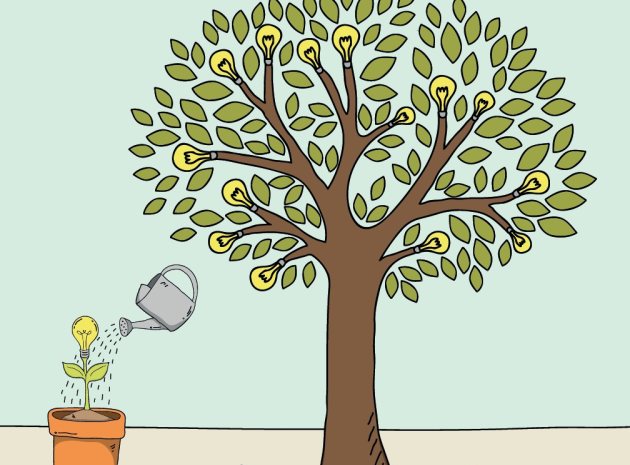What we tell young people about themselves can stunt their educational development – or enable them to flourish beyond all expectations, says Alexis Shea...
Our Western culture places natural, raw talent on a pedestal. Take the example of Usain Bolt; everybody loved the idea that he simply strolled up casually to the start line without much training and set a new world record for the 100m sprint, fuelled by a breakfast of chicken nuggets alone. The image of Bolt as someone with super-human powers is far more appealing than if, just like the rest of us, he has to struggle and work hard to achieve his goals.
However, other cultures admire hard work more than natural ability - and they are right to do this; there are countless studies highlighting how purposeful effort is the essential ingredient to learning. Most famously, Anders Ericsson’s, which found that the common quality shared by all expert violinists was their minimum of 10,000 hours of deliberate practice.
Unfortunately, our current education system was introduced at a time when we weren’t aware of the plasticity of our brains and the growing nature of intelligence. We unquestioningly accept that the setting of children in ‘same ability’ groupings will support the development of all children, especially the ‘brightest’; yet we ignore the fact it promotes fixed mindsets. As a country our summative tests place labels on children from an early age. These affect the perceptions of teachers as to the potential of pupils for learning and therefore the subsequent level of challenge they set for learners. This ultimately impacts the level of learning in which pupils engage.
Our teachers have grown up in a society which reveres effortless giftedness and are part of an establishment which is steeped in fixed mindset systems – but the good news is that there are things we can all do to create a growth mindset culture in our schools.
In our classrooms
Let’s start with something that doesn’t require a huge shift in your teaching practice but, nevertheless, you might find surprisingly difficult: changing the way you speak. You’ll be amazed by how much fixed mindset language you use without realising; just think about your own classroom, with those bright girls on the green table who’ve got all that potential and your red table with the less able pupils who do O.K. but have to try hard. Perhaps start with changing just one word and ask the pupils to help by correcting you every time you say it, for example replace ability with skill. Here are some common examples of fixed mindset language, with suggestions for empowering alternatives: Click here to view table. Another simple strategy is to give learners a chance to struggle. It can be hard to sit back and watch a pupil who is finding something difficult, especially when there is strong pressure to show ‘progress’. Yet it’s so important that children learn to embrace the feeling of struggling, that they learn to try harder and can look for alternative ways to find the answers.In our schools
Begin by looking at your school policies to ensure they embody growth mindset principles. Reports are an obvious example and it could be extended to include performance management indicators, to prompt teachers to actively encourage growth mindsets. On a grander scale consider the school structures; is it really necessary to set pupils in any subjects? At the school where I teach, we developed a ‘Challenge All’ approach. Pupils who had been placed on the G+T register at primary school were still tracked as was required by Ofsted but this was not shared publicly with pupils or staff. This meant that teachers didn’t focus their extension activities on the same small cohort of pupils (who were selected as ‘gifted’ based on their performance in a one-off test in Year 7). Instead, staff training focused on effective strategies for differentiating so that all learners at any given task in any lesson were encouraged to try more challenging activities. Do you reward pupils for effort or for ability? If you give prizes for effort that is at least in line with growth mindset thinking, however even this could reduce a child’s intrinsic motivation to learn. An alternative approach which we found to be extremely successful was to create a fund to which any pupils could bid for a specific item to help them improve at something about which they are passionate. Previous bids have included drama lessons, a graphic design tablet and more unusual items like specialist swimsuits for diving. At a later interview with the bursar and the head teacher pupils were required to show how they had tried to improve and become more expert with effort, devotion and resilience. There are many ways to develop a growth mindset school when you think creatively. I feel the starting point is to change the thinking of everyone in the organisation, by helping them to broaden their understanding of the concept of intelligence. I also think it is important to highlight that underlying everything is a ‘Slow Education’ philosophy. This recognises that transforming the way that teachers and learners think about intelligence from fixed to growth mindset, as well as adjusting their long-standing classroom habits, will be a slow process; it will take an investment of time and effort to bring about sustainable change and a culture of challenge.about the authorAlexis Shea is a teacher at Matthew Moss High School in Rochdale. Her previous roles have included gifted and talented coordinator and head of the project based learning faculty. She now also runs an organisation called Think.Grow.Learn. which develops life-long learners.










